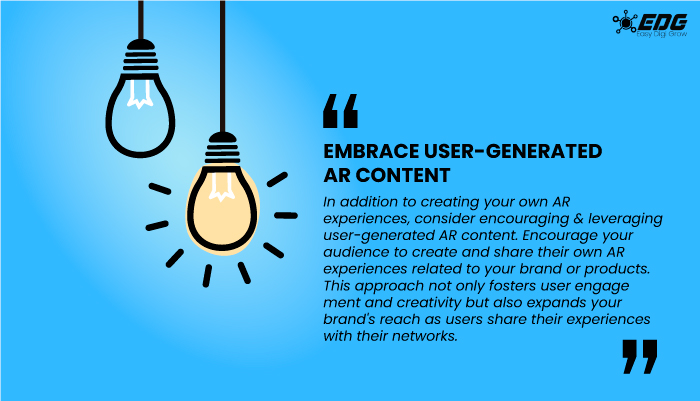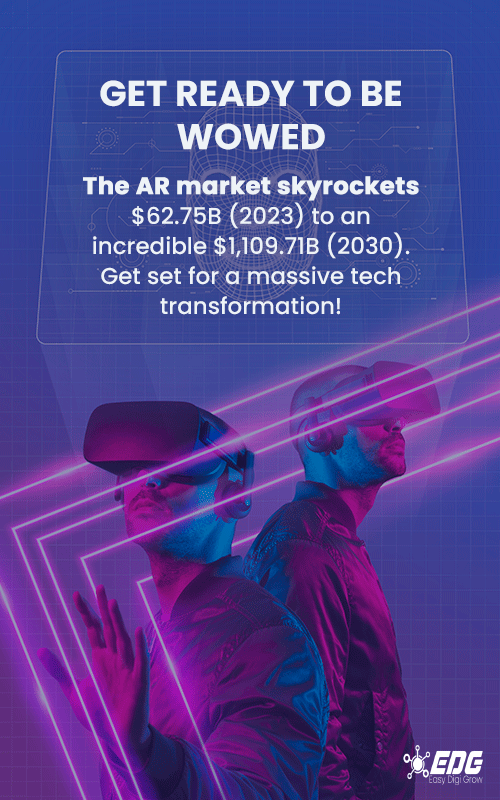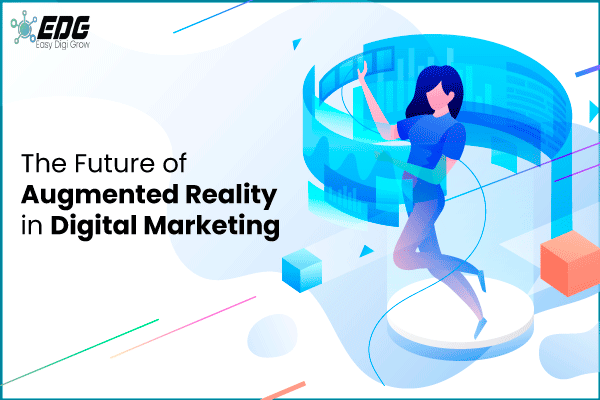Step into the future of Augmented Reality in Digital Marketing! Imagine a world where virtual elements seamlessly blend with reality, captivating your audience and transforming their brand experiences. From interactive product try-ons and personalized recommendations to hyper-localized campaigns and immersive events, AR opens infinite possibilities for digital marketers.
In this dynamic landscape, where technology evolves and user engagement is paramount, embracing these 15 future AR trends and opportunities is not just an option—it’s a strategic necessity.
So, fasten your seatbelts and get ready for a journey into the future of augmented reality in digital marketing
What is Augmented Reality?
Augmented reality is a technology that overlays digital content in the real world, providing users with an enhanced view of their surroundings.
Unlike virtual reality, which creates a completely immersive digital experience, augmented reality supplements the real world with digital elements.
Therefore, by using a device such as a smartphone or smart glasses, users can interact with virtual objects and information seamlessly integrated into their environment.
How Does Augmented Reality Work?
Augmented reality works by utilizing computer vision, object recognition, and tracking algorithms to understand the user’s environment and overlay digital content accordingly.
As a result, this process involves capturing the real-world environment through a camera, analyzing the image or video feed, and identifying points of interest where virtual content can be placed.
The virtual content is then rendered and displayed in real time, creating the illusion of digital objects coexisting with the physical world.
Understand the impact of digital marketing on your business with our comprehensive guide
The Present Role of Augmented Reality in Digital Marketing
Augmented Reality (AR) plays a significant role in digital marketing by enhancing user experiences, engaging customers, and driving brand awareness.
- Virtual Try-On: AR enables customers to virtually try on products such as clothing, accessories, or cosmetics. They can see how items look on them in real-time using their smartphone camera or AR-enabled devices.
- Product Visualization: AR allows users to visualize and interact with products in their real environment before making a purchase. They can view 3D models of products, explore different variations, and assess how they fit into their space or lifestyle.
Example: IKEA’s Place app enables users to place virtual furniture and home decor items in their rooms, giving them a realistic preview of how the products will look and fit in their homes.
Image Courtesy: IKEA
- Location-Based AR: AR can be leveraged to provide location-based experiences, guiding users to points of interest, offering additional information, or delivering promotional content based on their physical location.
- Enhanced Packaging and Print Materials: AR can transform traditional print materials, such as packaging, brochures, or magazines, into interactive experiences. Users can scan printed images or codes to unlock additional digital content, videos, or 3D animations.
Example: LEGO’s AR Studio app allows users to scan LEGO sets and see them come to life with interactive digital animations and stories.

Image Courtesy: LEGO
Rank your business on Google with our full-fledged SEO Ranking Guide
15 Future Trends and Opportunities – Augmented Reality in Digital Marketing
- Extended Reality (XR) Integration: As technology advances, the integration of augmented reality (AR), virtual reality (VR), and mixed reality (MR) will become more prevalent in digital marketing campaigns, providing immersive and interactive experiences for users.
- Web-based AR Experiences: WebAR, which allows users to access AR content through web browsers without the need for app downloads, will continue to grow in popularity. Digital marketers can leverage this trend to deliver AR experiences directly on websites, making them more accessible to a broader audience.
- Social Commerce with AR: Social media platforms will increasingly integrate AR features into their shopping experiences, enabling users to try on products, visualize them in their surroundings, and make purchases without leaving the app. Digital marketers can tap into this trend to drive sales and enhance customer engagement.
- AI-powered Personalization: Artificial intelligence (AI) will play a crucial role in analyzing user data and preferences to deliver highly personalized AR experiences. By leveraging AI algorithms, digital marketers can provide tailored content, product recommendations, and interactive features based on individual user profiles.
- Augmented Reality Search: AR search capabilities will emerge, allowing users to search for products, information, or locations using their smartphone cameras. Digital marketers can optimize their content and websites to appear in AR search results, ensuring visibility in this new form of search.
- Enhanced Remote Collaboration: AR will facilitate remote collaboration and communication, allowing teams to work together in virtual environments. Digital marketing companies can leverage this trend to enhance cross-functional collaboration, streamline workflows, and create virtual marketing experiences.
Bonus Tip:

- AR-powered Influencer Marketing: Influencers will increasingly incorporate AR experiences into their campaigns, collaborating with brands to promote products and engage their followers through interactive and immersive content. This trend opens up new avenues for digital marketers to harness the influence of creators in AR-driven campaigns.
- Spatial Audio Integration: Spatial audio, combined with AR, will enhance the immersion and realism of experiences by providing 3D soundscapes that match the virtual elements. Digital marketers can utilize spatial audio to create captivating audiovisual experiences that heighten user engagement and emotional connections.
- AR-enabled Smart Glasses: As AR-enabled smart glasses become more advanced and accessible, digital marketers can leverage this technology to deliver contextually relevant information, personalized recommendations, and interactive content directly to users’ fields of view, revolutionizing the way they engage with brands.
- Interactive AR Advertising: Interactive AR ads will become more prevalent, allowing users to actively engage with branded content, play games, or unlock exclusive offers through AR experiences. Digital marketers can create memorable and interactive ad campaigns that captivate audiences and drive conversions.

- Hyper-localized AR Experiences: AR will enable hyper-localized experiences, where users can access location-specific AR content and information. Digital marketers can target users based on their geographical location, delivering personalized AR campaigns tailored to specific regions, cities, or even individual stores.
- AR-powered Customer Support: AR will be leveraged to provide real-time assistance and support to customers. Through AR-enabled chatbots or virtual assistants, digital marketers can enhance customer service experiences by visually guiding users, troubleshooting issues, or providing product information.
- AR-powered Events and Activations: AR will transform events and activations by offering virtual attendance options, interactive experiences, and gamified elements. Digital marketers can create AR-driven event campaigns that engage both physical and remote attendees, extending reach and amplifying brand experiences.
- Eco-friendly AR Experiences: As sustainability becomes a growing concern, digital marketers can leverage AR to reduce the need for physical samples or displays, creating eco-friendly experiences. Users can virtually try on products, visualize home improvements, or test-drive vehicles, reducing waste and carbon footprint.
- AR-powered Training and Education: Augmented reality will be increasingly adopted in training and educational contexts. Digital marketing agencies can partner with educational institutions or develop their own AR learning experiences to provide interactive and immersive training materials, enhancing knowledge retention and engagement for learners.
These 15 future trends and opportunities for augmented reality in digital marketing showcase the potential for AR to revolutionize customer experiences, drive brand engagement, and create innovative marketing campaigns.
Trending topic: SEO Vs PPC – Which strategy you should choose
Conclusion
The augmented reality market is growing rapidly and is worth billions of dollars. Businesses must see AR as essential for their digital marketing strategy. By using these upcoming trends and opportunities, marketers can engage their audience, create memorable brand experiences, and stay ahead of their competitors.
As the leading digital marketing agency, EasyDigiGrow understands the transformative impact of Augmented Reality in Digital Marketing. With our unmatched skills and industry knowledge, we’ll help you captivate your audience like never before. Get ready to elevate your brand to new heights with the limitless potential of augmented reality.
Step into the future with EasyDigiGrow, where digital marketing meets augmented reality for extraordinary results.
FREQUENTLY ASKED QUESTIONS
- What are some examples of augmented reality in digital marketing in India?
Lenskart offers a virtual try-on feature through their mobile app. Users can virtually try on different eyeglasses and sunglasses using their smartphone camera, helping them make confident purchase decisions. Additionally, Myntra, uses AR to enhance the shopping experience. Their “Myntra Studio” feature allows users to virtually try on clothing and accessories, visualizing how they would look before making a purchase.
- How to use augmented reality in social media marketing?
AR is increasingly being utilized in social media marketing to enhance user engagement and create immersive experiences. Brands leverage AR filters, effects, and features on platforms like Instagram, Snapchat, and Facebook to offer unique and interactive content to their audiences. AR lenses and filters allow users to transform their appearance, try on virtual products, or overlay digital elements onto their photos and videos.
- What are the 3 types of AR?
Augmented reality (AR) encompasses three main types: marker-based AR, markerless AR (also known as location-based AR or SLAM), and projection-based AR.
- What are the benefits of augmented reality?
AR benefits: Enhanced experiences, interactive learning, improved product engagement, and increased sales potential.
- How is augmented reality advertising being used in India?
Augmented reality advertising in India is being utilized to deliver immersive and interactive brand experiences, engage consumers through AR-powered campaigns, and drive customer engagement and conversions.
 seolounge
seolounge


